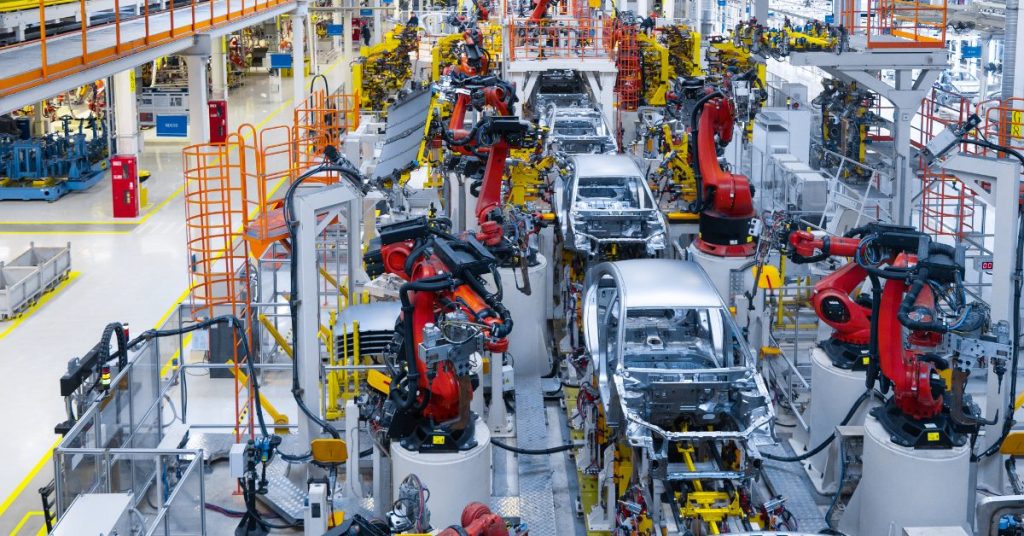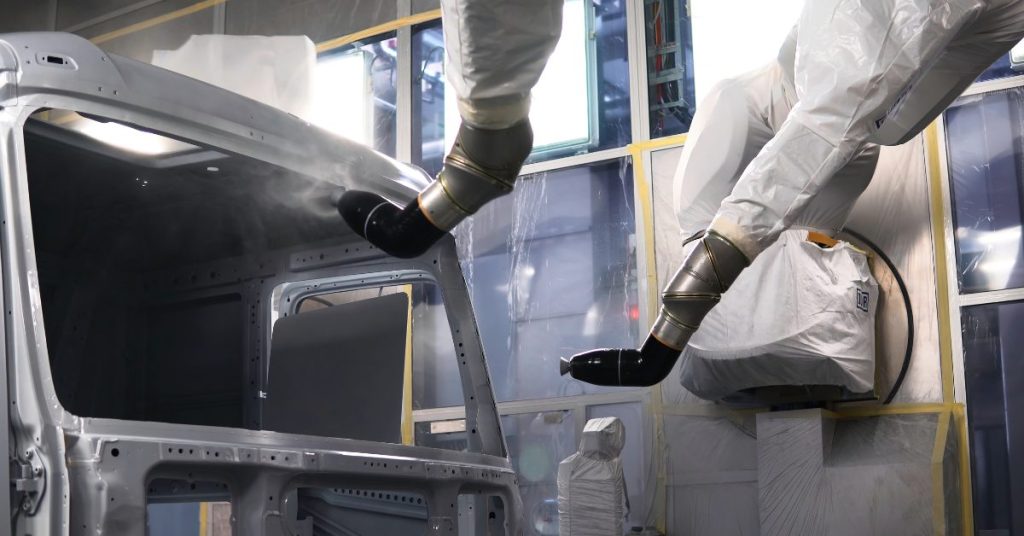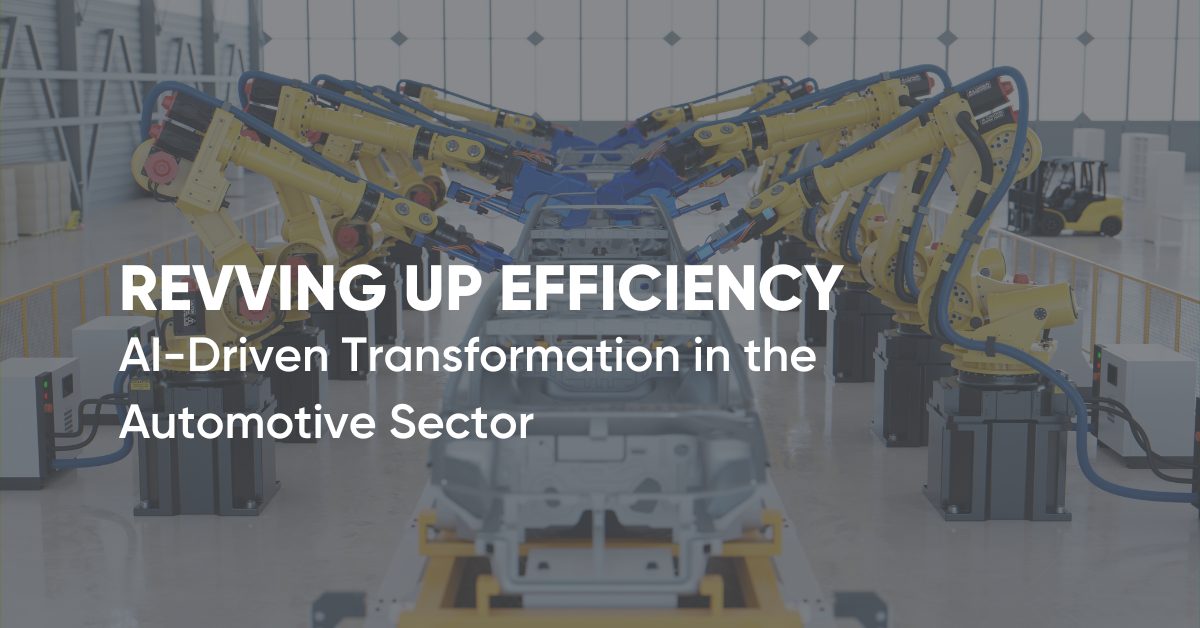The automotive industry, a cornerstone of modern transportation, has been on an incredible journey of innovation over the years. While much of the spotlight has been on electric vehicles (EVs) and autonomous driving, there’s another silent hero making waves behind the scenes: artificial intelligence (AI). The automotive industry, including automotive suppliers, is harnessing the power of AI to enhance both manufacturing processes and business operations. We’ll delve into real-world examples to showcase the tangible benefits of this AI-driven transformation.

Streamlining Manufacturing with Predictive Maintenance
One of the most critical aspects of automotive manufacturing is maintaining the efficiency and reliability of production lines. Downtime due to unexpected machinery failures can be incredibly costly. Enter AI-driven predictive maintenance.
AI systems, equipped with sensors and data analysis capabilities, continuously monitor the health of manufacturing equipment. They collect and analyze data on temperature, vibration, energy consumption, and more, identifying anomalies that could indicate impending failures. This predictive maintenance approach allows automotive manufacturers to proactively address issues before they lead to costly breakdowns.
AI in Action: General Motors (GM)
General Motors has been a pioneer in the application of AI for predictive maintenance. By using machine learning algorithms to analyze data from thousands of sensors on their assembly lines, GM can predict equipment failures with remarkable accuracy. This has not only reduced downtime but also significantly cut maintenance costs, ensuring smoother and more efficient production processes.

Enhancing Quality Control with Computer Vision
Quality control is paramount in the automotive industry, where even minor defects can have serious safety implications. Traditionally, human inspectors have played a central role in identifying and rectifying defects. However, this manual approach is time-consuming, subject to human error, and often not scalable for high-volume production.
AI, specifically computer vision, is changing the game. Machine learning models trained on vast datasets of images can detect imperfections and deviations from quality standards with incredible precision. And unlike human inspectors, the AI doesn’t get tired or “have a bad day.” This technology can identify defects in real-time, ensuring that only flawless vehicles leave the factory.
AI in Action: BMW
BMW utilizes computer vision and AI-powered quality control systems in its manufacturing processes. By employing cameras and machine learning algorithms, BMW can inspect every vehicle for paint defects, scratches, and other imperfections. This not only maintains high product quality but also speeds up the production process, resulting in cost savings.

Supply Chain Optimization through AI Forecasting
The automotive industry relies on complex and interconnected supply chains where the timing of deliveries can be critical. Disruptions in the supply chain, whether due to natural disasters, geopolitical factors, or unforeseen circumstances like the COVID-19 pandemic, can have far-reaching consequences. AI-driven forecasting and optimization tools are helping automotive companies adapt to these challenges.
AI can analyze a vast array of data sources, including historical sales data, supplier performance, and external factors like weather patterns and economic trends. With this information, it can predict demand fluctuations, optimize inventory levels, and suggest alternative suppliers or logistics routes to mitigate disruptions.
AI in Action: Ford
Ford has implemented AI-driven supply chain forecasting solutions to improve its production planning. By using advanced analytics and AI algorithms, Ford can better predict the demand for specific vehicle models and adjust its manufacturing schedules accordingly. This has allowed Ford to reduce excess inventory and respond more effectively to market changes.
Personalizing Customer Experiences with AI
Beyond manufacturing, AI is also transforming the way automotive companies interact with their customers. AI-powered chatbots and virtual assistants are becoming increasingly prevalent in customer service. These AI-driven tools can provide instant responses to customer inquiries, assist with vehicle troubleshooting, and even personalize marketing messages based on customer preferences and behaviors.
AI in Action: Tesla
Tesla, known for its innovative approach to technology, has incorporated AI-driven features into its vehicles. Tesla’s Autopilot system, powered by AI and machine learning, offers advanced driver-assistance capabilities and continues to improve through over-the-air software updates. Furthermore, Tesla’s customer app provides real-time vehicle diagnostics and predictive maintenance recommendations, enhancing the overall ownership experience.

Optimizing Financial Management with AI
Automotive companies are also leveraging AI to improve financial management. AI algorithms can analyze financial data, market trends, and economic indicators to provide more accurate revenue forecasts, cost projections, and risk assessments. This enables better decision-making at the executive level and helps companies navigate volatile economic conditions.
AI in Action: Toyota
Toyota has implemented AI-driven financial management systems to enhance its decision-making processes. By analyzing a wide range of financial and economic data, Toyota can make informed decisions about investments, pricing strategies, and cost management. This strategic use of AI has contributed to Toyota’s continued financial stability and growth.
The automotive industry, including automotive suppliers, has always been a technology leader, and is now undergoing a profound transformation thanks to artificial intelligence. From predictive maintenance and quality control to supply chain optimization, customer engagement, and financial management, AI is driving efficiency, innovation, and cost savings across the board. As these real-world examples demonstrate, AI is not just a buzzword; it’s a tangible force that is reshaping the automotive landscape. As the industry continues to evolve, we can expect AI to play an increasingly central role in shaping the future of transportation.
The road ahead is paved with opportunities for automotive companies to harness AI’s potential fully. As they navigate this exciting journey, they will undoubtedly find new and creative ways to leverage AI to improve manufacturing and business operations, setting the stage for a brighter, more efficient, and technologically advanced automotive future.


